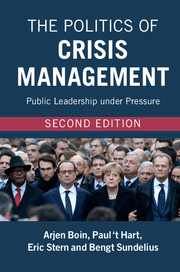Book contents
- Frontmatter
- Contents
- List of Figures
- List of Tables
- Introduction to the Second Edition
- 1 Managing Crises: Five Strategic Leadership Tasks
- 2 Sense Making: Grasping Crises as They Unfold
- 3 Decision Making and Coordinating: Shaping the Crisis Response
- 4 Meaning Making: Constructing a Crisis Narrative
- 5 Ending a Crisis: Managing Accountability
- 6 Learning and Changing: From Crisis to Reform
- 7 How to Deal with Crisis: Lessons for Prudent Leadership
- References
- Index
1 - Managing Crises: Five Strategic Leadership Tasks
Published online by Cambridge University Press: 15 December 2016
- Frontmatter
- Contents
- List of Figures
- List of Tables
- Introduction to the Second Edition
- 1 Managing Crises: Five Strategic Leadership Tasks
- 2 Sense Making: Grasping Crises as They Unfold
- 3 Decision Making and Coordinating: Shaping the Crisis Response
- 4 Meaning Making: Constructing a Crisis Narrative
- 5 Ending a Crisis: Managing Accountability
- 6 Learning and Changing: From Crisis to Reform
- 7 How to Deal with Crisis: Lessons for Prudent Leadership
- References
- Index
Summary
Crisis Management and Public Leadership
Governance has increasingly become a matter of crisis management. Crises routinely shatter the peace and order of societies. They arrive as “rude surprises” and “inconvenient truths” wreaking havoc and destroying the legitimacy of public institutions. Natural disasters, the collapse of financial systems, high-tech catastrophes, lone-wolf terrorists, mass revolts, new pandemics, geopolitical powder kegs, and cyber attacks – the list of potential crises is long and growing.
Disruptions of the dominant order are as old as life itself. The Bible can be read as a catalog of the frightening crises that have beset humankind since time immemorial. Most of the world still confronts these “old” crises on a regular basis. But we also see new crises – and new twists on more familiar ones – that define the times we live in: Lehman Brothers and the Euro crisis, Arab Spring and failed states, Fukushima and Deepwater Horizon, Mumbai and Paris, Ebola and ISIS.
In such times of crisis, citizens look to their leaders. The system is out of kilter, and leaders are expected to chart pathways out of the crisis. The public expects them to avert the threat or at least minimize the damage of the crisis at hand. They must explain what went wrong. They must adapt, change or abandon routine ways of operating where needed and create public confidence in the new status quo. They should work toward enhancing community resilience, preparing society for future shocks.
Crises provide real-world “stress tests” to the resilience of political systems and the crisis management capacities of leaders. They play out against a backdrop of public expectations (influenced in part by leaders themselves) that can be very challenging to meet. In some cases, the quality of crisis management makes the difference between life and death, chaos and order, breakdown and resilience. When governments and their leaders respond well to a crisis, the damage is limited. When emerging vulnerabilities and threats are adequately assessed and addressed, some potentially devastating contingencies simply do not happen. When crisis management fails, the impact increases.
Crisis management bears directly on the lives of citizens and the well-being of societies. The notion of “crisis management” as used in this book is shorthand for a set of interrelated and extraordinary governance challenges.
- Type
- Chapter
- Information
- The Politics of Crisis ManagementPublic Leadership under Pressure, pp. 3 - 22Publisher: Cambridge University PressPrint publication year: 2016
- 6
- Cited by



